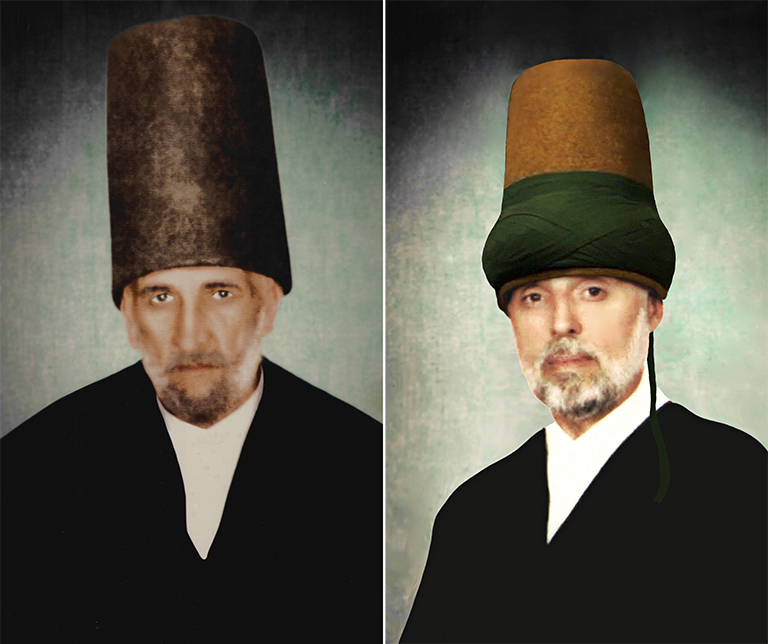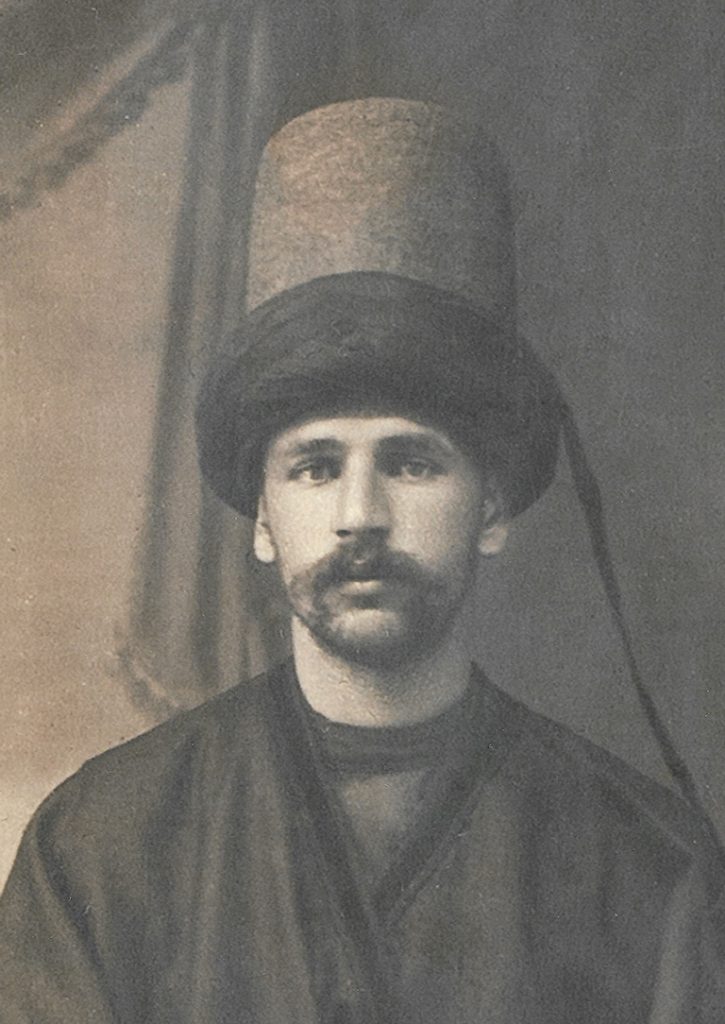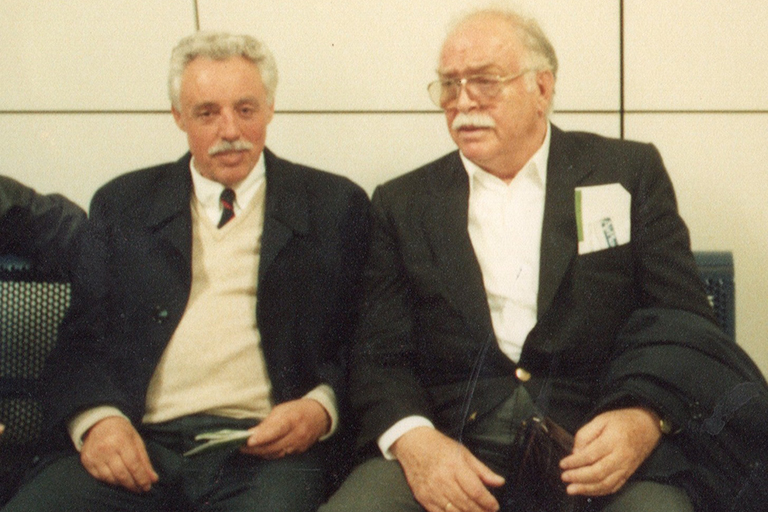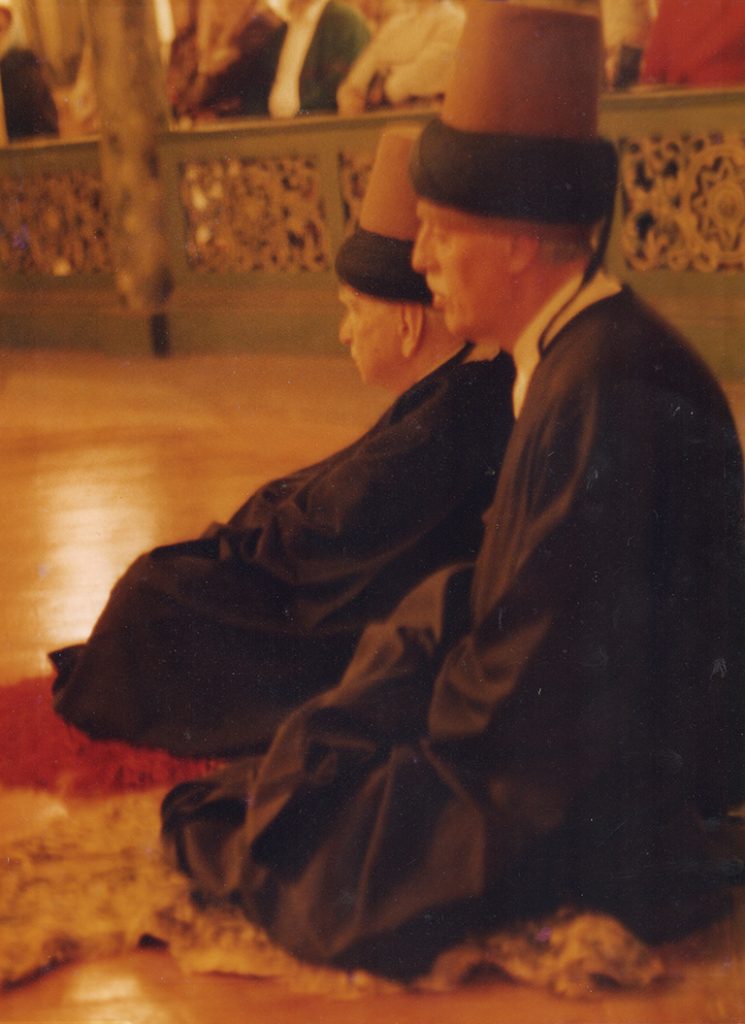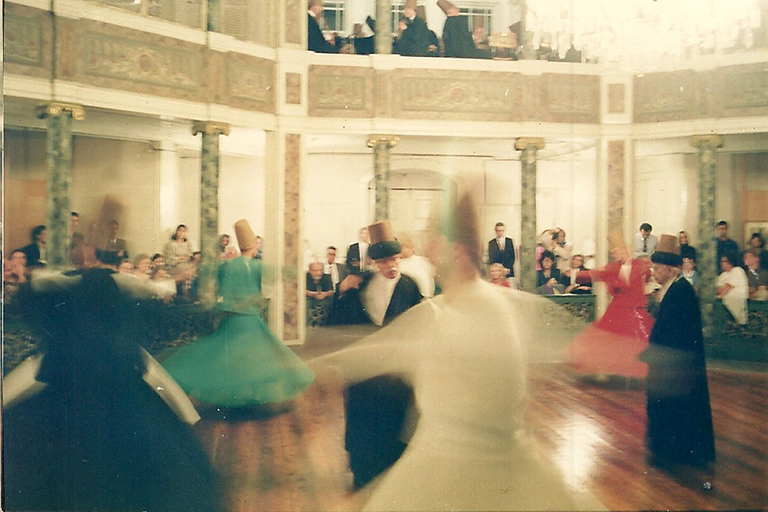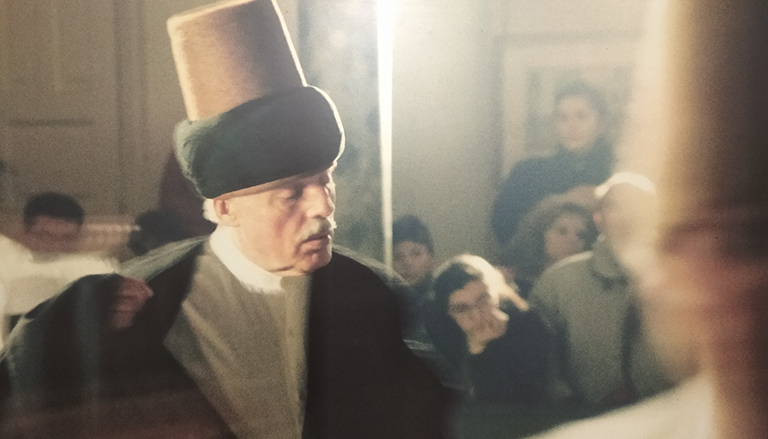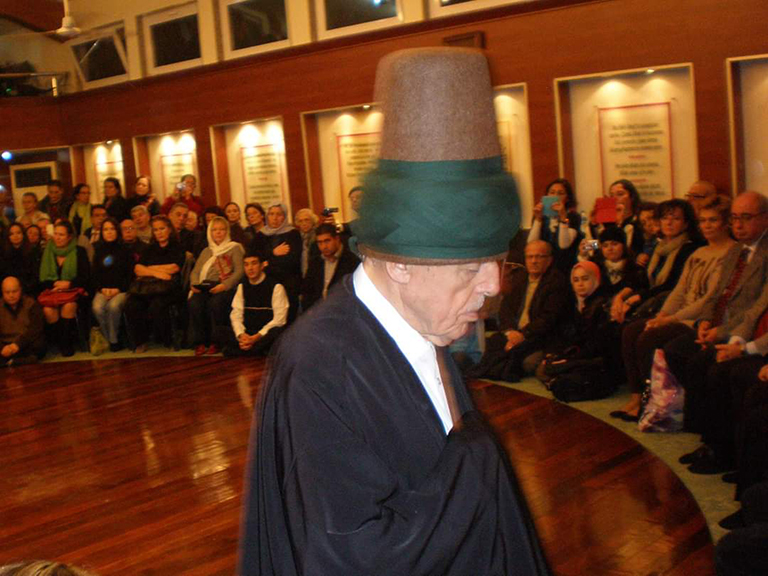Hasan Rıza (Çıkar) Dede
Hasan Çıkar Dede, the Honorary President of the Silivrikapı Mevlana Cultural Center, was born in Skopje (Üsküp), Macedonia, in 1935. At that time, Skopje was one of the most significant cultural, artistic, and academic centers in the Balkans.
During his childhood, Hasan Dede received a religious education in a city with many spiritual institutions. He fulfilled duties in the Murat Paşa and Yahya Paşa mosques in Skopje, completed his education, and migrated to Istanbul with his family at the end of 1959.
The religious education he gained from his family, along with the influence of Sufi circles in Skopje and his growing love and interest for Sufism in Istanbul, led him to Hakkı Dede, whom he had known in Skopje and who would become his Murshid Kamil (Spiritual Guide) in the future. After meeting Hakkı Dede and witnessing his wisdom, he became his student and devoted himself to Mevlevi culture. Their relationship continued with the spiritual revelations Hakkı Dede imparted to him. Accordingly, Hasan Dede attained spiritual representativeness of Exalted Mevlana in 1965.
In 1987, he represented Exalted Mevlana with the title of “postnişin” (Head of the Dervish Lodge) at the Şeb-i Arus (Wedding Night) held in Konya. The red woolfell of the meydan (the area where dervishes perform the ritual) that Exalted Mevlana used 800 years ago was passed down to his grandchildren and successors after he departed from this life for God. After Mevlana’s last grandson Bakır Çelebi, Selman Dede (who became postnişin of Konya) safeguarded this trust for thirty years and handed it to Hasan Dede under the spiritual command of Exalted Mevlana in 1993.
Hasan Dede, who fulfilled the spiritual representativeness of Exalted Mevlana, served through Sema rituals performed at the Silivrikapı Mevlana Cultural Center until his passing on October 13, 2018. He created a welcoming space for his followers and visitors at the Galata Mevlevi Lodge, where he was the Honorary President of the Galata Mevlevi Lodge Association for 26 years (from 1981 until 2007), when restoration began there, as well as with the Contemporary Mevlana Lovers Group (Silivrikapı Mevlana Cultural Center is located in Şehremini, Fatih). Most of the hymns sung by the group were composed by Hasan Dede.
Silivrikapı Mevlana Cultural Center is open to the public every Thursday night from 7:30 PM to 10:30 PM, to convey Exalted Mevlana’s message of unity to all humanity through Hasan Dede’s video conversations (subtitled in English) and Sema rituals.
OH HUMAN
Oh human, my God has loaded you with a thousand secrets.
Oh human, you are the mirror; He is the Sultan of Beauty.
What exists in the universe exists in you at every moment.
Oh human, seek yourself within; know yourself.
If all the secrets you possess were revealed,
oh human, the sky and the earth would become a garden of roses.
If only this arrogance were wiped away from humanity, then see:
oh human, every Pharaoh would seem like Prophet Moses.
You are the first and the last entity in the world;
oh human, you are the only entity in the presence of God; you are the successor of God.
You are the only entity of the earth and the sky; you are the light of the universe.
Universes have manifested within you; you are the representative of God, oh human.
Hasan Dede
***
Hasan Dede talked about Exalted Mevlana as follows;
Among all the thinkers, countless saints, and lovers of the Divine Truth, there is no one like Mevlana. Mevlana is not only a monument of humility for the era he lived in, but also a monument of humility for all eras, radiating enlightenment. The path of Mevlana is love and peace. He is the thinking head and listening heart of all humanity.
According to Mevlana, love is “the strongest link of the chain that connects man to life” and “the ladder that will lead us to God and humanity.” Mevlana, who burned with the love of God, served humanity until his last breath. He always wanted people to be useful and to serve society.
In this regard, he said: “Even a candle knows that it will melt away; it keeps burning…
Why should you, O man, who are full of the power of the Creator, hold back?
Mevlana’s every word and action is full of messages of unity and brotherhood. His call is to all humanity. Mevlana attaches great importance to solidarity among people and believes that cooperation can only be achieved through the understanding that it is a beautiful behavior seen in mature individuals:
“If people do not help each other and do not want each other’s happiness, they are neither mature nor human!”
Mevlana is a person who thinks of, favors, and loves others in all matters. At the same time, he mends hearts, soothes pain in people, melts away evil, purifies hearts, and cleanses them.
Mevlana was the sultan of forgiveness and understanding, where all crimes are washed away and purified, and where all sins are immaculate. One day, when someone said to him, “So and so has never sinned,” Rumi replied, “If only he had committed a crime and then regretted it…”
Exalted Mevlana’s temperament was pleasant and sweet, radiating fresh hope at every moment; he knew how to joke.
When someone got angry with another and shouted, “I will skin your hide!” Mevlana responded, “What a good man. We have to shed our skin (nafs) day and night in order to attain the mercy of God. I wish he would come and save us from the trouble of it!”
He was a master of humanity who made us laugh and think at the same time.
According to Mevlana, the friendship of those who worship wealth and property is worldly.
He believed that the condition of true friendship is to sacrifice oneself for one’s friend and to fight for one’s friend when necessary.
Mevlana loved those who cherished everything they had. His understanding of love was not based on material interests.
It was not rooted in deception, but in the enthusiasm of brave hearts and unconditional love.
When he says that love is the cure for everything, he meant:
“Bitter things become sweet because of love; copper becomes gold because of love.
Because of love, sediments become purified and clear, and troubles become remedies because of love.”
When Rumi says that the most beautiful love is the love for God, he means that there is no love like the one for God and offers the good news of eternal life. In one of his verses, he says:
“Those who are gathered in love do not die like this crowd of people…”
In another verse, he states:
“Do not be without love, so you will not be dead. Die in love so that you remain alive.”
Mevlana’s book, called Masnavi, is based on the love of humanity and embodies unlimited tolerance, goodness, charity, and patience. It teaches tranquility, tolerance, moderation, mercy, and forgiveness. “The greatest knowledge is the knowledge of love.”
No one in the history of the world has been nourished by love as much as he was; no one has expressed love as much as he did. He has reached perfection in love and immortality.
His books Diwan and Rubaiyat are about his eternal love, while Fihi Ma Fihi and Majalis-i Seba summarize his conversations and include his twenty-six thousand couplets of Masnavi as a testament to his perfection.
In one of his Rubais, he says: “Love came and became the blood in my veins; it emptied me of myself and filled me with love. All that remains of me is a name; the rest is all love…”
Mevlana is a man of heart who teaches the way of immortality to future generations with the sensitivity of an elixir. People find the cure in him and seek virtue and truth in his words.
This love of Rumi is as cool as the morning wind; he is a friend to hearts separated from friends. According to Rumi, the most important task of man is to find his identity and realize the truth of God. Only in this way can one be worthy of the title of humanity. He says: “If you haven’t seen your lover, if you haven’t found him, why don’t you call him? If you have found him, why don’t you get excited?”
The extraordinary value Mevlana places on the free will of individuals makes human beings sacred. For this reason, he attaches particular importance to self-knowledge. Even the worst human being is worthy of forgiveness and love.
He said: “No matter who you are, it is important to remember the people around you without discrimination. Even if the person is an enemy, it is good to show kindness. Because kindness may change them.”
Exalted Mevlana’s ideas were fresh and new in every era. He called people to unite, to perish, and to dissolve in the unity of God. He opposed all kinds of institutions and ideas that were incompatible with human sensitivity. He is the sultan of hearts who makes no distinction between men and women, rich and poor. He won the love and friendship of women and engaged in conversations with them to glorify them. The supreme sultan, who looks at the essence of people rather than their outward appearance, tried to enlighten them with the light of God.
Ahmet Eflaki Dede tells the following story in the Legend of the Sufis: “Every Friday evening, all the ladies of Konya are invited to visit the Sultan’s deputy, Emüniddin Michael’s wife. They would gather in her presence and beg her to invite Mevlana. When the congregation gathered, it was expected that Mevlana would come in complete peace. After the evening prayers, he would visit alone and sit with them without disturbing anyone. The women made a ring around him and scattered rose petals on him. Among them, Mevlana shared meanings and secrets until morning, busy with his advice. While concubines and neyzen women sang accompanied by the neys he blew, the Sema was performed at the end.”
The extraordinary value Mevlana places on the free will of individuals makes human beings sacred. For this reason, he attaches particular importance to self-knowledge. Even the worst human being is worthy of forgiveness and love.
He said: “No matter who you are, it is important to remember the people around you without discrimination. Even if the person is an enemy, it is good to show kindness. Because kindness may change them.”
Exalted Mevlana’s ideas were fresh and new in every era. He called people to unite, to perish, and to dissolve in the unity of God. He opposed all kinds of institutions and ideas that were incompatible with human sensitivity. He is the sultan of hearts who makes no distinction between men and women, rich and poor. He won the love and friendship of women and engaged in conversations with them to glorify them. The supreme sultan, who looks at the essence of people rather than their outward appearance, tried to enlighten them with the light of God.
Ahmet Eflaki Dede tells the following story in the Legend of the Sufis: “Every Friday evening, all the ladies of Konya are invited to visit the Sultan’s deputy, Emüniddin Michael’s wife. They would gather in her presence and beg her to invite Mevlana. When the congregation gathered, it was expected that Mevlana would come in complete peace. After the evening prayers, he would visit alone and sit with them without disturbing anyone. The women made a ring around him and scattered rose petals on him. Among them, Mevlana shared meanings and secrets until morning, busy with his advice. While concubines and neyzen women sang accompanied by the neys he blew, the Sema was performed at the end.”
